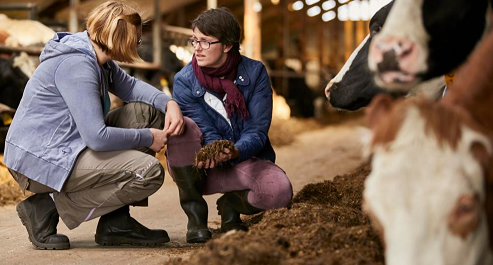Inside BENEO’s new pulse plant: pioneering sustainable protein from faba beans
Arla Foods farmer owners are already among the most climate friendly dairy farmers in the world, producing milk with less than half the average of emissions per litre compared to global dairy production
The 9,900 farmer owners behind the European dairy cooperative, Arla Foods, are accelerating their efforts to reduce their carbon footprint. Arla Foods is the first dairy company in Europe to introduce an initiative across seven countries that will triple the speed of CO2e reductions on farm and accumulate one of the world’s largest sets of externally verified climate data from dairy farming.
Arla Foods farmer owners are already among the most climate friendly dairy farmers in the world, producing milk with less than half the average of emissions per litre compared to global dairy production. Now Arla Foods is introducing a new Climate Check programme and comprehensive support to all its 9,900 farmer owners in Northern Europe to fight climate impact. This will pave the way for the company to reach its ambition to reduce carbon emission by 30 per cent by 2030 and have a neutral climate impact by 2050.
The new global standardized tool for Climate Checks on farms in seven European countries builds on the successful climate check model that was introduced to Arla farmers in Denmark in 2013. The Climate Check will help the farmer identify emissions on farm and provides a clear picture of the actions farmers can take to reduce emissions further. Each Arla farmer will input information covering everything from herd size to housing, milk volumes, feed usage and feed production, energy and fuel usage and renewable energy production.
The Climate Check programme will include a digital reporting tool, in which all farmers will submit their climate data. The data is verified by an external advisor who will visit the farm to provide advice on action plans.
As data from potentially 9,900 European dairy farms and an annual production of 14 billion litres of milk is submitted during 2020, Arla is building one of the world’s largest sets of externally verified climate data from dairy farming. This will be the solid foundation for benchmarking, knowledge sharing across the dairy industry and correlation analysis.
The data captured will enable each farmer owner to see what level of carbon emissions they produce per litre of milk and identify where there is room for improvement. Arla will support its farmer owners to deliver reductions of 3% per year on average which would see Arla on track to reach its ambition to reduce carbon emission by 30 per cent by 2030 and have a neutral climate impact by 2050. However, farmer owners who have used the earlier model have shown that it can help reduce carbon emission by up to 4 per cent per year.
To support the farmer owners in using the new Climate Checks, Arla’s Board of Directors has decided that farmers who sign up to the Climate Check in 2020 will be paid a financial incentive of one eurocent per kilo of milk. Based on earlier initiatives, a financial incentive has proven to be effective in supporting programme roll-outs. Arla Foods Chairman Jan Toft Nørgaard expects the vast majority of Arla farmers to sign up to the Climate Check, thereby accelerating work to reduce carbon emissions.

